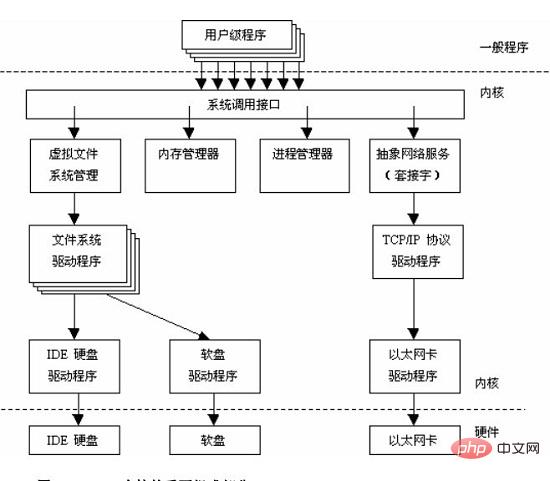What is the structure of linux
The structure of the Linux system is divided into four parts: 1. Kernel, the core of the operating system is responsible for managing the system's processes, memory, device drivers, etc.; 2. Shell, the user interface of the system, provides the connection between the user and the kernel An interface for interactive operations; 3. File system, a method of organizing files stored on storage devices such as disks; 4. Applications, including assembly of text editors and programming languages.

#The operating environment of this tutorial: linux7.3 system, Dell G3 computer.
What is the structure of Linux
Linux systems generally have 4 main parts: kernel, shell, file system and applications. The kernel, shell, and file system together form the basic operating system structure that allows users to run programs, manage files, and use the system.
Kernel
The kernel is the core of the operating system and has many of the most basic functions. It is responsible for managing the system's processes, memory, and device drivers. , file and network systems, determine the performance and stability of the system.
The Linux kernel consists of the following parts: memory management, process management, device drivers, file system and network management, etc. As shown in the figure:

# System call interface: The SCI layer provides certain mechanisms to perform function calls from user space to the kernel. This interface is architecture dependent, even within the same processor family. SCI is actually a very useful function call multiplexing and demultiplexing service. You can find the implementation of SCI in ./linux/kernel and the architecture-dependent parts in ./linux/arch.
Linux Shell
Shell is the user interface of the system, providing an interface for users to interact with the kernel. It receives commands entered by the user and sends them to the kernel for execution. It is a command interpreter. In addition, the shell programming language has many characteristics of ordinary programming languages. Shell programs written in this programming language have the same effect as other applications.
Currently there are mainly the following versions of shell.
1. Bourne Shell: Developed by Bell Labs.
2. BASH: It is GNU's Bourne Again Shell. It is the default shell on the GNU operating system. Most Linux distribution packages use this shell.
3. Korn Shell: It is a development of Bourne SHell and is compatible with Bourne Shell in most aspects.
4. C Shell: It is the BSD version of SUN Company Shell.
linux file system
The file system is an organization method for files stored on storage devices such as disks. Linux systems can support a variety of currently popular file systems, such as EXT2, EXT3, FAT, FAT32, VFAT and ISO9660.
linux application
The standard Linux system generally has a set of programs called applications, which includes text editors, Programming languages, X Window, office suites, Internet tools and databases, etc.
Recommended learning: Linux video tutorial
The above is the detailed content of What is the structure of linux. For more information, please follow other related articles on the PHP Chinese website!

Hot AI Tools

Undresser.AI Undress
AI-powered app for creating realistic nude photos

AI Clothes Remover
Online AI tool for removing clothes from photos.

Undress AI Tool
Undress images for free

Clothoff.io
AI clothes remover

Video Face Swap
Swap faces in any video effortlessly with our completely free AI face swap tool!

Hot Article

Hot Tools

Notepad++7.3.1
Easy-to-use and free code editor

SublimeText3 Chinese version
Chinese version, very easy to use

Zend Studio 13.0.1
Powerful PHP integrated development environment

Dreamweaver CS6
Visual web development tools

SublimeText3 Mac version
God-level code editing software (SublimeText3)

Hot Topics
 What computer configuration is required for vscode
Apr 15, 2025 pm 09:48 PM
What computer configuration is required for vscode
Apr 15, 2025 pm 09:48 PM
VS Code system requirements: Operating system: Windows 10 and above, macOS 10.12 and above, Linux distribution processor: minimum 1.6 GHz, recommended 2.0 GHz and above memory: minimum 512 MB, recommended 4 GB and above storage space: minimum 250 MB, recommended 1 GB and above other requirements: stable network connection, Xorg/Wayland (Linux)
 vscode cannot install extension
Apr 15, 2025 pm 07:18 PM
vscode cannot install extension
Apr 15, 2025 pm 07:18 PM
The reasons for the installation of VS Code extensions may be: network instability, insufficient permissions, system compatibility issues, VS Code version is too old, antivirus software or firewall interference. By checking network connections, permissions, log files, updating VS Code, disabling security software, and restarting VS Code or computers, you can gradually troubleshoot and resolve issues.
 How to run java code in notepad
Apr 16, 2025 pm 07:39 PM
How to run java code in notepad
Apr 16, 2025 pm 07:39 PM
Although Notepad cannot run Java code directly, it can be achieved by using other tools: using the command line compiler (javac) to generate a bytecode file (filename.class). Use the Java interpreter (java) to interpret bytecode, execute the code, and output the result.
 Linux Architecture: Unveiling the 5 Basic Components
Apr 20, 2025 am 12:04 AM
Linux Architecture: Unveiling the 5 Basic Components
Apr 20, 2025 am 12:04 AM
The five basic components of the Linux system are: 1. Kernel, 2. System library, 3. System utilities, 4. Graphical user interface, 5. Applications. The kernel manages hardware resources, the system library provides precompiled functions, system utilities are used for system management, the GUI provides visual interaction, and applications use these components to implement functions.
 Can vscode be used for mac
Apr 15, 2025 pm 07:36 PM
Can vscode be used for mac
Apr 15, 2025 pm 07:36 PM
VS Code is available on Mac. It has powerful extensions, Git integration, terminal and debugger, and also offers a wealth of setup options. However, for particularly large projects or highly professional development, VS Code may have performance or functional limitations.
 How to use VSCode
Apr 15, 2025 pm 11:21 PM
How to use VSCode
Apr 15, 2025 pm 11:21 PM
Visual Studio Code (VSCode) is a cross-platform, open source and free code editor developed by Microsoft. It is known for its lightweight, scalability and support for a wide range of programming languages. To install VSCode, please visit the official website to download and run the installer. When using VSCode, you can create new projects, edit code, debug code, navigate projects, expand VSCode, and manage settings. VSCode is available for Windows, macOS, and Linux, supports multiple programming languages and provides various extensions through Marketplace. Its advantages include lightweight, scalability, extensive language support, rich features and version
 How to check the warehouse address of git
Apr 17, 2025 pm 01:54 PM
How to check the warehouse address of git
Apr 17, 2025 pm 01:54 PM
To view the Git repository address, perform the following steps: 1. Open the command line and navigate to the repository directory; 2. Run the "git remote -v" command; 3. View the repository name in the output and its corresponding address.
 What is vscode What is vscode for?
Apr 15, 2025 pm 06:45 PM
What is vscode What is vscode for?
Apr 15, 2025 pm 06:45 PM
VS Code is the full name Visual Studio Code, which is a free and open source cross-platform code editor and development environment developed by Microsoft. It supports a wide range of programming languages and provides syntax highlighting, code automatic completion, code snippets and smart prompts to improve development efficiency. Through a rich extension ecosystem, users can add extensions to specific needs and languages, such as debuggers, code formatting tools, and Git integrations. VS Code also includes an intuitive debugger that helps quickly find and resolve bugs in your code.






